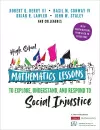
High School Mathematics Lessons to Explore, Understand, and Respond to Social Injustice
4 authors - Paperback
£29.99
Robert Q. Berry III is the Dean of the College of Education at the University of Arizona and the Paul L. Lindsey & Kathy J. Alexander Chair. Berry served as President of the National Council of Teachers of Mathematics (NCTM), 2018–2020. He holds a B.S. in middle grades education from Old Dominion University, a M.A.T. in mathematics education from Christopher Newport University, and a Ph.D. in mathematics education from the University of North Carolina at Chapel Hill. He taught in public schools and served as a mathematics specialist. Robert has collaborated with teachers, leaders, parents, and community members across the United States and has been a teacher at nearly all levels. These experiences have afforded him a perspective on the issues facing mathematics teaching and learning across diverse contexts. He sees himself as a teacher who is always learning and improving my professional practice. He brings a strong sense of equity and fairness, rooted in my understanding of the mathematical experiences of students of color and the belief that all students deserve access to learning environments and resources that support their engagement with mathematics. He brings an ability to establish rapport and trust with people from diverse backgrounds by working to understand their perspectives, histories, and lived experiences. He understands the importance of building partnerships and how to draw on each partner′s strengths to achieve a common goal. In sum, he brings experiences and abilities that make me an effective advocate for teachers and students. Basil Conway IV is an associate professor of mathematics education in the College of Education and Health Professions at Columbus State University and serves as the mathematics education graduate programs director. He serves on numerous doctoral committees as both a chair and methodologist. He earned his BS, MS, and PhD. in mathematics education from Auburn University in 2005, 2012, and 2015, respectively. He also completed his MS in statistical science at Colorado State University in 2010. Basil previously spent 10 years teaching in public middle and high schools before he became a teacher educator. During this time, he also worked as an instructor at a local junior college. Over the past 17 years of service in teaching mathematics and future teachers of mathematics, he has served in various local mathematics education leadership positions and organizations including Transforming East Alabama Mathematics (TEAM-Math), Auburn University’s Teacher Leader Academy, East Alabama Council for Teachers of Mathematics, Woodrow Wilson Fellow, National Mathematics and Science Initiative, and A+ College Ready. He has published works related to teaching mathematics for social justice in numerous books and journals and has a special interest in statistics education. Basil’s lens for teaching and student learning draws heavily from Vygotsky’s theory of social constructivism in which language and culture play essential roles in human intellectual development. Thus, he believes the co-construction of knowledge is paramount in the development of students’ social, religious, and mathematical identities. He believes teachers, parents, other students, cultural norms, and other cultural communicative devices play a critical role in shaping students’ knowledge of themselves, faith, and mathematics. Brian R. Lawler is currently an Associate Professor for Mathematics Education in the Bagwell College of Education at Kennesaw State University and serves as coordinator for the secondary mathematics teacher certification programs. He earned his doctorate in Mathematics Education at The University of Georgia. He received his B.S. in Mathematics from Colorado State University, M.A. in Curriculum and Instruction from California State University Dominguez Hills, and M.A. in Mathematics from The University of Georgia. Previously, Brian taught high school mathematics for 9 years in a variety of settings, including suburban, urban, and urban/rural settings. Throughout his quarter-century career in mathematics education, he has advised school districts and provided professional development to high school math teachers as they aim to transform their programs in order to meet the needs of all learners—in discourse-rich, heterogeneous classrooms. He is a contributing author to the second edition of the Interactive Mathematics Program, a four-year, college preparatory, problem-based high school mathematics curriculum designed particularly for untracked classrooms. Brian draws upon a Piagetian epistemological framework, a critical pedagogy, a Deweyan progressivism, and a post-structural worldview to theorize an equitable and socially just framework for mathematics education. This emerges as a Critical Mathematics Education, in which the child’s mathematics and the mathematics of society are both held, not in tension, but as interacting, in order to understand learning and teaching of mathematics in its sociopolitical context. His research focuses on the personal epistemology of adolescent mathematical learners, and power and privilege in the science, practice, and politics of Mathematics and Mathematics Education. John W. Staley has been involved in mathematics education for over 30 years as a secondary mathematics teacher, leader, adjunct professor, and consultant.In his current role as coordinator of special projects in Baltimore County Public Schools, his primary work involves supporting schools in the continuous improvement process. He earned his bachelor of science in mathematics from the University of Maryland, College Park; a master’s in secondary education from Temple University; and a PhD in mathematics education leadership from George Mason University. John has presented at state, national, and international conferences; served on many committees and task forces; facilitated workshops and professional development sessions on a variety of topics; received the Presidential Award for Excellence in Teaching Mathematics and Science; and served in leadership roles as president for NCSM, the mathematics education leadership organization, and chair of the U.S. National Commission on Mathematics Instruction. As part of the writing teams for Catalyzing Change in High School Mathematics: Initiating Critical Conversations (NCTM, 2018), Framework for Leadership in Mathematics Education (NCSM, 2020), and High School Mathematics Lessons to Explore, Understand, and Respond to Social Injustice (Berry et al., 2020), John continues his life work and passion to Change the Narrative about who is seen as being doers and learners of mathematics.